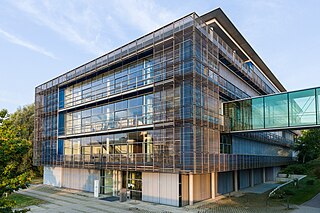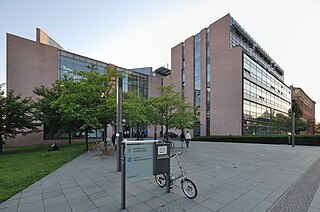
The Max Planck Society for the Advancement of Science is a formally independent non-governmental and non-profit association of German research institutes. Founded in 1911 as the Kaiser Wilhelm Society, it was renamed to the Max Planck Society in 1948 in honor of its former president, theoretical physicist Max Planck. The society is funded by the federal and state governments of Germany.
The Max Planck Institute for Informatics is a research institute in computer science with a focus on algorithms and their applications in a broad sense. It hosts fundamental research as well a research for various application domains. It is part of the Max-Planck-Gesellschaft, Germany's largest publicly funded body for foundation research.

The Max Planck Institute of Biochemistry (MPIB) is a research institute of the Max Planck Society located in Martinsried, a suburb of Munich. The institute was founded in 1973 by the merger of three formerly independent institutes: the Max Planck Institute of Biochemistry, the Max Planck Institute of Protein and Leather Research, and the Max Planck Institute of Cell Chemistry.

The Max Planck Institute for Biophysical Chemistry, also known as the Karl-Friedrich Bonhoeffer Institute, was a research institute of the Max Planck Society, located in Göttingen, Germany. On January 1, 2022, the institute merged with the Max Planck Institute for Experimental Medicine in Göttingen to form the Max Planck Institute for Multidisciplinary Sciences.

The Gottfried Wilhelm Leibniz Prize, in short Leibniz Prize, is awarded by the German Research Foundation to "exceptional scientists and academics for their outstanding achievements in the field of research". Since 1986, up to ten prizes are awarded annually to individuals or research groups working at a research institution in Germany or at a German research institution abroad. It is considered the most important research award in Germany.
The Max Planck Institute for Molecular Genetics is a research institute for molecular genetics based in Berlin, Germany. It is part of the Max Planck Institute network of the Max Planck Society for the Advancement of Science.

The Max Planck Institute for Molecular Biomedicine was founded on 1 April 2001 in Münster, North Rhine-Westphalia, Germany. It is part of the Max Planck Society. The current managing director is professor Dietmar Vestweber.

The Max Planck Institute for Biology is a research institute located in Tübingen, Germany, and was formerly known as the Max Planck Institute for Developmental Biology. A predecessor institution operated under the same name from 1948 to 2004.

The Max Planck Institute of Experimental Medicine was a research institute of the Max Planck Society, located in Göttingen, Germany. On January 1, 2022, the institute merged with the Max Planck Institute for Biophysical Chemistry in Göttingen to form the Max Planck Institute for Multidisciplinary Sciences.

The Max Planck Institute for Evolutionary Biology is a German institute for evolutionary biology. It is located in Plön, Schleswig-Holstein, Germany.
The Max Planck Institute for Developmental Biology Tübingen was located in Tübingen, Germany; it was founded as Max Planck Institute for Virus Research in 1954 as an offshoot of the Tübingen-based Max Planck Institute for Biology. From 1984 to 2021, it was named Max Planck Institute for Developmental Biology. The topics of scientific research conducted at the institute cover a very wide range -- from biochemistry, cell and developmental biology to evolutionary and ecological genetics, functional genomics and bioinformatics -- in order to address fundamental questions in microbial, plant and animal biology, including the interaction between different organisms.
The Max Planck Institute of Experimental Endocrinology, located in Hannover, Germany, was one of 80 institutes in the Max Planck Society (Max-Planck-Gesellschaft). It was founded 1979 to supersede the Max Planck Institute of Cell Biology in Wilhelmshaven. Molecular developmental biology and neuroendocrinology were the two research areas of the institute. The institute was closed 2006 and parts of its research activities were moved to the Max Planck Institute for Biophysical Chemistry in Göttingen.

The Max Planck Institute of Molecular Physiology is located in Dortmund, next to the Dortmund University of Technology. It is one of 80 institutes in the Max Planck Society.

The Max Planck Institute for Medical Research in Heidelberg, Germany, is a facility of the Max Planck Society for basic medical research. Since its foundation, six Nobel Prize laureates worked at the Institute: Otto Fritz Meyerhof (Physiology), Richard Kuhn (Chemistry), Walther Bothe (Physics), André Michel Lwoff, Rudolf Mößbauer (Physics), Bert Sakmann and Stefan W. Hell (Chemistry).

The Fritz Haber Institute of the Max Planck Society (FHI) is a science research institute located at the heart of the academic district of Dahlem, in Berlin, Germany.

The Max Planck Institute of Immunobiology and Epigenetics in Freiburg, Germany is an interdisciplinary research institute that conducts basic research in modern immunobiology, developmental biology and epigenetics. It was founded in 1961 as the Max Planck Institute of Immunobiology and is one of 86 institutions of the Max Planck Society. Originally named the Max Planck Institute of Immunobiology, it was renamed to its current name in 2010 as it widened its research thrusts to the study of epigenetics.

The Max Planck Institute for Infection Biology (MPIIB) is a non-university research institute of the Max Planck Society located in the heart of Berlin in Berlin-Mitte. It was founded in 1993. Arturo Zychlinsky is currently the Managing Director. The MPIIB is divided into nine research groups, two partner groups and two Emeritus Groups of the founding director Stefan H. E. Kaufmann and the director emeritus Thomas F. Meyer. The department "Regulation in Infection Biology" headed by 2020 Nobel laureate Emmanuelle Charpentier was hived off as an independent research center in May 2018. The Max Planck Unit for the Science of Pathogens is now administratively independent of the Max Planck Institute for Infection Biology. In October 2019, Igor Iatsenko and Matthieu Domenech de Cellès established their research groups at the institute, Mark Cronan started his position as research group leader in March 2020. Silvia Portugal joined the institute in June 2020 as Lise Meitner Group Leader. Two more research groups where added in 2020, Felix M. Key joined in September and Olivia Majer in October, completing the reorganization of the Max Planck Institute for Infection Biology.
The Max Planck Institute of Molecular Plant Physiology is a German research institute for molecular plant physiology, based in the Golm district of Potsdam, Brandenburg. Founded on 1 January 1994, the MPIMP focuses on the study of the dynamics of plant metabolism and how that relates to the entire plant system. The institution is one of the 80 institutes in the Max Planck Society (Max-Planck-Gesellschaft).
KFWA 103.1 is a radio station licensed to Weldona, Colorado.
Hans-Georg Schweiger was a German cell biologist and a former director of the Max Planck Institute for Cell Biology.












